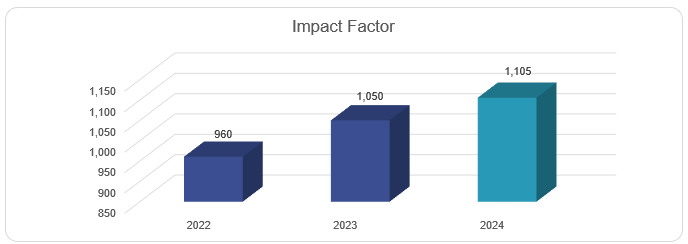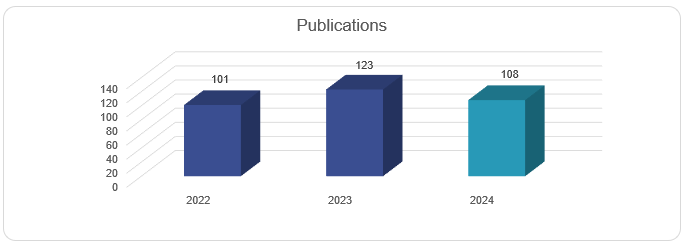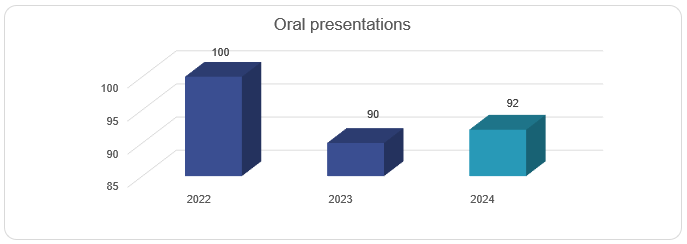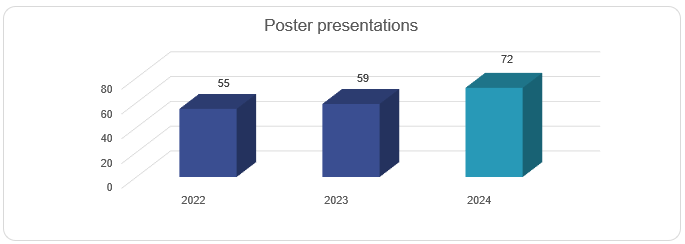The Scientific Activity Reports

EBMT continues its commitment to continually advance the delivery of excellence in scientific research and education, both in the traditional but necessary face-to-face setting and in the online format. The number of publications from the EBMT Working Parties (WPs) and their corresponding impact factors have steadily increased over the years, together with the participation in international meetings and the achievements of significant milestones.




A significant milestone achieved by the ALWP is the comprehensive data collection on next-generation sequencing (NGS) and the use of novel therapeutics. This initiative aims to enhance the quality of the registry and strengthen the scientific impact of publications, ultimately improving patient care. The new Haemoglobinopathies WP (HWP) has also celebrated its first year of activity and successfully presented real world data from the EBMT registry for sickle cell disease and Transfusion Dependent Thalassaemia. The CTIWP conducts extensive research on transplant outcomes, including immunogenetics, conditioning regimens, and CAR T cell therapy. Key studies focus on post-CAR T fertility and its use in autoimmune diseases, in collaboration with the ADWP, expanding its application beyond malignancies. Another key area is CAR T outcomes in frail elderly patients, assessing toxicities and long-term results. The CMWP has led global guidelines on relapse management post-allograft for Myelofibrosis (MF), optimal pre-transplant MF-related splenomegaly management, and multiple surveys on transplantation practices to identify unmet needs for consensus-based strategies.
The EBMT Educational Programme is a cornerstone in disseminating knowledge, promoting best practices, and fostering professional growth in the fields of hematopoietic cell transplantation (HCT) and cellular therapy (CT). The newly established EBMT Educational Task Force is thoroughly working towards providing a wider and updated portfolio on the latest trends and advancements in these rapidly evolving fields which will be accessible worldwide, not only through the WP educational meetings and mid-size events, but also through the new online educational library and other e-learning resources and the creation of the core curriculum and the EBMT exam.
In April, we celebrated EBMT’s 50th Anniversary at the Annual Meeting in Glasgow. More than 5,000 healthcare professionals gathered to honour five decades of research and care, fostering collaboration and innovation. A key publication, Half a Century of Healing, highlights EBMT’s ongoing commitment to its mission, diversity, inclusion, and patient-centred care.
August 2024 marked the first anniversary of the official launch of EBMT’s new registry platform. To further strengthen the scientific rigor of its research, EBMT is working to improve the data collection forms for all diagnoses, treatments, and follow-ups through a thorough review and refinement process. Since 2016, EBMT and JACIE developed a benchmarking project for EBMT transplant centres, and this year will continue, with reports being based on the new established registry. On 9 September 2024, the Registry reached a historic milestone by recording data for 10,000 CAR-T therapy patients, highlighting the growing impact of these therapies. As the numbers rise, cell and gene therapy presents evolving challenges. In response, EBMT remains committed to strengthening collaborations with other societies, resulting in research projects and various publications. A recent example is the joint publication with the European Regional Committee of the International Society for Cell & Gene Therapy and EBMT, addressing the current challenges in the field.
Moreover, the already established Practice Harmonisation and Guidelines Committee of EBMT successfully conducted the second annual workshops in September, aimed at standardizing HCT and CT clinical practices while harmonizing procedures within EBMT. These two years’ efforts resulted in 11 high-level publications already available, with four more forthcoming, all to be accessible via open access at the EBMT educational library.
EBMT is making significant progress in advancing the integration of basic/fundamental and translational cellular and gene therapy science across all our societies' initiatives. These efforts include redefining the structure and content of current and future educational events, expanding grant opportunities, and establishing a robust bioinformatics support network, with a particular focus on incorporating machine learning approaches, among others. To further strengthen the integration of basic and translational research into EBMT's activities, efforts are also underway to identify common priorities across disciplines.
More and exciting projects ahead! Looking forward to a stimulating and scientifically enriching 51th Annual Meeting of the EBMT in April 2025 in Florence!
